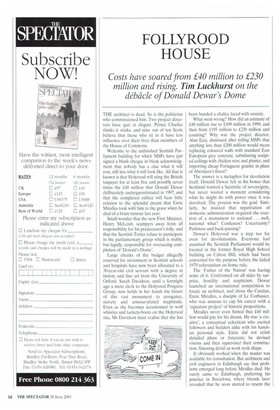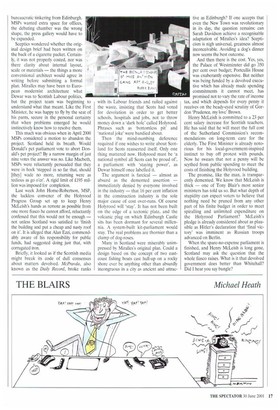FOLLYROOD HOUSE
Costs have soared from £40 million to £230
million and rising. Tim Luckhurst on the
debacle of Donald Dewar's Dome
THE architect is dead. So is the politician who commissioned him. Two project directors have quit in disgust. Prince Charles thinks it stinks, and nine out of ten Scots believe that those who sit in it have less influence over their lives than members of the House of Commons.
Welcome to the unfinished Scottish Parliament building for which MSPs have just signed a blank cheque in bleak acknowledgment that nobody has a clue what it will cost, still less what it will look like. All that is known is that Holyrood will sting the British taxpayer for at least five and possibly seven times the £40 million that Donald Dewar deliberately underguesstimatecl in 1997, and that the completed edifice will bear little relation to the splendid dream that Enric Miralles took with him to the grave when he died of a brain tumour last year.
Small wonder that the new First Minister, Henry McLeish, scampers away from all responsibility for his predecessor's folly, and that the Scottish Tories refuse to participate in the parliamentary group which is risibly, but legally, responsible for overseeing completion of 'Donald's Dome'.
Large chunks of the budget allegedly reserved for investment in Scottish schools and hospitals have now been allocated to a 30-year-old civil servant with a degree in history and fine art from the University of Oxford. Sarah Davidson, until a fortnight ago a mere clerk to the Holyrood Progress Group, now holds in her hands the future of this vast monument to arrogance, naivety and armour-plated ineptitude. Even as she becomes accustomed to wolf whistles and tackety-boots on the Holyrood site, Ms Davidson must realise that she has been handed a chalice laced with arsenic.
What went wrong? How did an estimate of £40 million rise to £109 million in 1999, and then from £195 million to £230 million and counting? Why was the project director. Alan Ezzi, dismissed after telling MSPs that anything less than £200 million would mean replacing coloured walls with standard East European grey concrete, substituting sculpted ceilings with chicken wire and plaster, and importing cheap Portuguese granite in place of Aberdeen's finest?
The answer is a metaphor for devolution itself. Donald Dewar felt in his bones that Scotland wanted a facsimile of sovereignty, but never wasted a moment considering what he might do with power once it was devolved. The process was the goal. Similarly, he insisted that repatriation of domestic administration required the erection of a monument to national . . well, national what? Confusion? Uncertainty? Pettiness and buck-passing?
Dewar's Holyrood was a step too far even for devolutionists. Everyone had assumed the Scottish Parliament would be located in the former Royal High School building on Calton Hill, which had been converted for the purpose before the failed 1979 referendum on home rule.
The 'Father of the Nation' was having none of it. Confronted on all sides by surprise, hostility and scepticism, Dewar launched an international competition to locate an architect, and chose the Catalan, Enric Miralles, a disciple of Le Corbusier, who was anxious to cap his career with a 'signature project' of historic proportions.
Miralles never even hinted that £40 million would pay for his dream. He was 'a creative', a conceptual eclecticist who excited followers and builders alike with his handson personal style. Enric did not relish detailed plans or forecasts; he devised visions and then supervised their construction, finessing detail as work took shape.
It obviously worked when the master was available for consultation. But architects and civil engineers in Edinburgh say that problems emerged long before Miralles died. He rarely came to Edinburgh, preferring his practice in Barcelona, where friends later revealed that he soon started to resent the bureaucratic tinkering from Edinburgh. MSPs wanted extra space for offices. the debating chamber was the wrong shape, the press gallery would have to be expanded.
Sceptics wondered whether the original design brief had been written on the back of a cigarette packet. Certainly, it was not properly costed, nor was there clarity about internal layout, scale or materials — the things a more conventional architect would agree in writing before submitting a formal plan. MiraIles may have been to European modernist architecture what Dewar was to Scottish Labour politics, but the project team was beginning to understand what that meant. Like the First Minister, he was happy to fly by the seat of his pants, secure in the personal certainty that when problems emerged he would instinctively know how to resolve them.
This much was obvious when in April 2000 MSPs considered a motion to abandon the project. Scotland held its breath. Would Donald's pet parliament vote to abort Donald's pet project? By a narrow margin of just nine votes the answer was no. Like Macbeth, MSPs were reluctantly persuaded that they were in hock 'stepped in so far that, should [they] wade no more, returning were as tedious as go o'er'. A rigid limit of £195 million was imposed for completion.
Last week John Home-Robertson, MSP, the luckless convener of the Holyrood Progress Group set up to keep Henry McL,eish's hands as remote as possible from one more fiasco he cannot afford, reluctantly confessed that this would not be enough — not unless Scotland was satisfied to 'finish the building and put a cheap and nasty roof on it'. It is alleged that Alan E771, commendably aware of his responsibility for public funds, had suggested doing just that, with corrugated iron.
Briefly, it looked as if the Scottish media might break its code of dull consensus about matters devolved. McPravda, also known as the Daily Record, broke ranks with its Labour friends and railed against the waste, insisting that Scots had voted for devolution in order to get better schools, hospitals and jobs, not to throw money down a dark hole' called Holyrood. Phrases such as 'bottomless pit' and `national joke' were bandied about.
Then the mind-numbing deference required if one wishes to write about Scotland for Scots reasserted itself. Only one thing mattered now. Holyrood must be 'a national symbol all Scots can be proud of', a parliament with 'staying power', as Dewar himself once labelled it.
The argument is farcical — almost as absurd as the demented assertion — immediately denied by everyone involved in the industry — that 16 per cent inflation in the construction industry is the sole major cause of cost over-runs. Of course Holyrood will 'stay'. It has not been built on the edge of a tectonic plate, and the volcanic plug on which Edinburgh Castle sits has been dormant for several millennia. A system-built kit-parliament would stay. The real problems are thornier than a clump of dog-roses.
Many in Scotland were miserably unimpressed by Miralles's original plan. Could a design based on the concept of two eastcoast fishing boats cast hull-up on a rocky shore ever be anything other than absurdly incongruous in a city as ancient and attrac
tive as Edinburgh? If one accepts that even the New Town was revolutionary in its day, the question remains: can Sarah Davidson achieve a recognisable adaptation of Miralles's idea? Scepticism is nigh universal, greatness almost inconceivable. Avoiding a dog's dinner now seems the best outcome.
And then there is the cost. Yes, yes, the Palace of Westminster did go 350 per cent over budget; Portcullis House was exuberantly expensive. But neither was being funded by a devolved executive which has already made spending commitments it cannot meet, has promised not to vary the rate of income tax, and which depends for every penny it receives on the beady-eyed scrutiny of Gordon 'Prudence, my love' Brown.
Henry McLeish is committed to a 23 per cent salary increase for Scottish teachers. He has said that he will meet the full cost of the Sutherland Commission's recommendations on long-term care for the elderly. The First Minister is already notorious for his local-government-inspired instinct to buy off protest with pounds. Now he swears that not a penny will be scythed from public spending to meet the costs of finishing the Holyrood building.
The promise, like the man, is transparently demented. We know that McLeish is thick — one of Tony Blair's most senior ministers has told us so. But what depth of stupidity can expect voters to believe that nothing need be pruned from any other part of his finite budget in order to meet spiralling and unlimited expenditure on the Holyrood Parliament? McLeish's pledge is already considered about as plausible as Hitler's declaration that 'final victory' was imminent as Russian troops advanced on Berlin.
When the spare-no-expense parliament is finished, and Henry McLeish is long gone, Scotland may ask the question that the whole fiasco raises. What is it that devolved government does better than Whitehall? Did I hear you say bungle?











































































 Previous page
Previous page